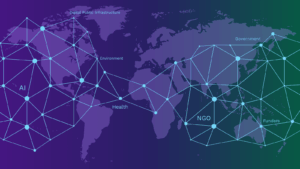The Datasphere Initiative is a global network of stakeholders building agile frameworks to responsibly unlock the value of data for all.
Bringing their knowledge and research to the Datasphere Initiative since late 2021, 9 Fellows from 8 countries have been tasked with conducting research on relevant policymaking topics covered by the Datasphere Initiative including but not exclusively: best practices and frameworks for data governance, free flow of data, data governance to support the Sustainable Development Goals and innovation within issues such as climate change, health, and agriculture.
A key part of their work is to explore the concept of the “Datasphere” itself and how it can be useful for designing best practices and frameworks for data governance. The short videos that follow share the first take on their thoughts on the concept of Datasphere and why it is useful. In internal workshops, fellows joined the rest of the team of the Datasphere Initiative and agreed that the Datasphere, further developed in this article, can be defined as the complex system encompassing all types of data and the complex dynamics between data, human groups, and norms.
In the videos, the Fellows highlight the utility in naming new research, development, and testing space to consider data and its relationships to human groups and norms, as well as the dynamics of cross-border data flows and interactions with data infrastructure. Breaking silos is crucial to advance the opportunities generated by data to face the greatest challenges in the world today — from climate change to health to innovation.
See the highlights and videos below

In this exploration, Fellow Benjamin Akinmoyeje who is a PhD Informatics research student at the Namibia University of Science and Technology, and ICT4D practitioner, shared reflections in the context of health data in Africa. Benjamin notes how over many years data has been harvested from public health interventions with little opportunities for African data subjects to have a say in what this data is used for. For Benjamin, the concept of the Datasphere offers an opportunity for end-users to have meaningful conversations around data use and value and there is a need to raise awareness around the benefits data can offer and drive capacity in leveraging data as a resource.
“The Datasphere gives us the capacity and avenue for discussion on the issue of a data economy for all.”

Fellow Francesco Vogelezang who is a Policy Analyst at the Open Future Foundation, considers the Datasphere as a phenomenon that can be witnessed in natural science such as the hydrosphere or the atmosphere. Focusing on the word “sphere” Francesco unlines how this space suggests a lack of typical state actors, because human activities and regulation has privileged spaces with clearly defined boundaries. According to Francesco, this does not mean that the Datasphere has no regulation, as state actors have had an implicit and in-direct effect in the Datasphere.
“Proliferation of different jurisdictional standards when it comes to internet regulation, has led to the balkanization of cyberspace. This requires a new assessment of previous and ongoing efforts in regulating the Datasphere which can shed light on how this phenomenon is regulated.”

In her exploration, Kassy Raymond, Datasphere Initiative Fellow and a doctoral student in Computational Sciences at the University of Guelph, frames the “Datasphere” as a digital space that consists of all data that is created by machines and humans. The data in the Datasphere is characterized not only by content but also by nature eg. use, category, interpretations, and contextualization of those who own and use data. Highlighting the relevance of the systematic relationships between different but interrelated data, Kassy considers that the concept of the Datasphere supports understanding of how data is something that can travel and flow. In her exploration Kassy shares the variety of ways data produced by people or machines can be used. Whether data use surrounds estimates, reports, or machine learning, AI, data is often traveling across countries and jurisdictions.
“This data travel also creates more data and becomes part of the Datasphere.”

Nashilongo Gervasius is a Datasphere Initiative Fellow and a Digital Policy Researcher, Media and Communications Specialist, and Trainer and Development Practitioner. According to her, the Datasphere is the contested space where collection, governance, and use of data is determined by the multitudes of players among the digital data ecosystem.
“The Datasphere is determined by the multitudes of players among the digital data ecosystem.”

Fellow, Christian Perrone is Public Policy Consultant and Head of the Rights and Technology and GovTech teams at ITS Rio. He shares how the Datasphere encourages us to think about data beyond a specific country and culture. While we usually think of data as information in smartphones or stored in the cloud, this is just a snapshot of what it means to talk about data. Christian points to the need to understand the dynamic flow that data has and the new layer of data-driven reality that we live in. For example, when you think about data as static it has consequences. These may be around rules followed by specific cultural or legal patterns.
“The Datasphere is an opportunity to discuss more fully what data really is and the part it plays in our lives.”

For Asaf Lubin, Datasphere Initiative Fellow and Associate Professor at Indiana University, the concept of the Datasphere is more helpful than previous terms that have been used to explain aspects of digitalization such as “cyberspace” and “metaverse” which are rooted in the “territorial” and “physical” space. Contrastingly, the word “sphere” is a fluid term with a spatial dimension or implying a sphere as a shape. Asaf also points to how the sphere also has an abstract dimension: it is a field of activity and control and power as the International Relations term “the sphere of influence”.
“The Datasphere attempts to bring together spatial and abstract that realigns and structures data governance and bridges what has been siloed.”

Datasphere Initiative Fellow Magdalena Ewa Jozwiak who is a Researcher and Lecturer at Tilburg University considers the act of tagging the entire ecosystem built around data with its own term “the Datasphere” is very relevant and helps organize debates around data. According to Magdalena, the Datasphere concept helps to imagine data in all complexity of the multidimensions relationships between sets of data and billions of data both public and private, and evolving norms. While there has been a focus in academic contexts on personal data, the concept of the Datasphere shifts from topical to broader and systemic debate, encouraging reflection on larger trends and power relationships between public and private actors. Datasphere is worth studying to uncover emerging customs and practices not yet regulated by any legal frameworks.
“I imagine the Datasphere as a no man’s land where various forces compete to assert power. By understanding Datasphere as a separate space with its own processes we can start a discussion about how this space should be governed and what values we want to protect in that space.”




